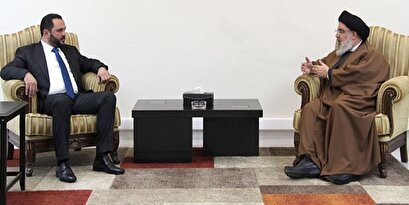 Ali Youssef Hejazi, secretary general of the Syrian Ba'athist Arab Party (Arab Ba'ath party), met with Sayyid Hassan Nasrallah in Lebanon.
Ali Youssef Hejazi, secretary general of the Syrian Ba'athist Arab Party (Arab Ba'ath party), met with Sayyid Hassan Nasrallah in Lebanon.
According to Al-Ahd, the meeting, which lasted three hours, discussed the latest developments in Lebanon, including the upcoming parliamentary elections.
Earlier, the head of the Free National Movement in Lebanon, Gibran Basil, announced the names of the group's candidates in the upcoming parliamentary elections, stressing that they would form an alliance with Hezbollah.
Basil said:
The one who reached out to us for the electoral coalition is Hezbollah, as we reached out to it on February 6, 2006, when they tried to isolate it.
He added:
There is a big party in Lebanon and that party is corruption. Their plan for the elections is to overthrow the compensation of the bacillus and the free national movement, not to reform the country and its economy.
1,043 people ran for constituency. 155 of the total announced number are women and make up 15% of the total number of candidates.
Lebanon's 2022 elections are the largest in terms of the number of candidates in the last 15 years. In the 2018 elections, 976 people, including 111 women; In the 2009 election, 702 people, including 12 women, and in the 2005 election, 484 people, including 16 women, ran.
Lebanon's parliamentary elections are held every four years, and 128 seats in parliament are divided between Christians and Muslims under the Taif Agreement (signed in 1989): 28 for Sunnis, 28 for Shiites, 8 for Druze, 34 for Maronite Christians, 14 seats for Orthodox Christians, 8 seats for Catholic Christians, 5 seats for Armenians, 2 seats for Alawites and one seat for Christian minorities.